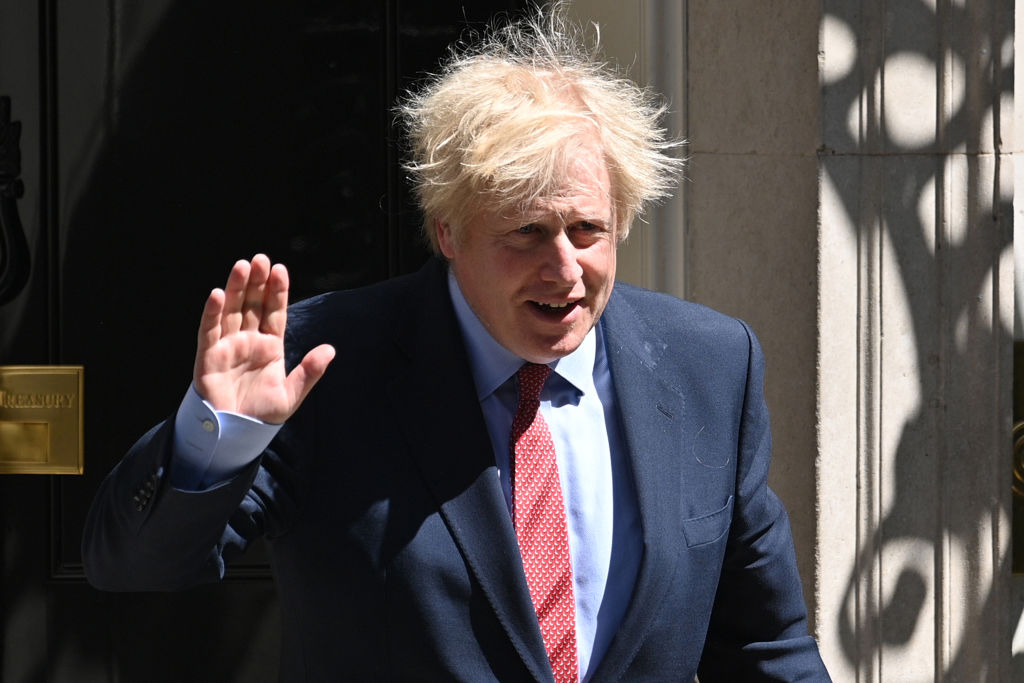Boris Johnson’s Plan to Avoid Accountability for His Government’s Scandals Is to Run Out the Clock
Boris Johnson has learned a trick from David Cameron: no matter how badly a member of the government misbehaves, ignore demands for their resignation and wait until the press loses interest. So far, the strategy is working for him in the current Dominic Cummings scandal — but his luck might run out.

Prime Minister Boris Johnson leaves 10 Downing Street on May 20, 2020 in London, England. Leon Neal / Getty
During the Tony Blair years, resignations after minor disturbances seemed to occur with alarming regularity: Tessa Jowell; Peter Mandelson (twice); Estelle Morris; Robin Cook; Peter Kilfoyle; and many others. Yet when David Cameron assumed the premiership, his approach differed — members of parliament involved in scandals were kept in place until the press forgot about their transgressions. And it worked. The only two sackings were Amber Rudd, essentially taking the blame for the wrongful deportation of the Windrush generation, and Priti Patel, who had used her holiday to Israel to meet and attempt to broker deals with Israeli politicians.
Cameron’s approach differed sharply from Blair’s by refusing to accept wrongdoing: the prime minister believed that the newspaper headlines would pass with few noticing, and those who did notice would be distracted by the next headline or scandal, without the public demanding accountability for government transgressions.
By and large, he was right — and now Boris Johnson has adopted his strategy, in fact pushing it further. The complete flouting of lockdown rules by Johnson’s aide, Brexit guru Dominic Cummings, has been one of the most widely covered stories in the press since it was first broken by the Mirror and the Guardian. People care deeply about it because they are confined to their homes and cannot see friends and family. For all Cummings’s railing against the elite, he feels the rules don’t apply to him. Many are cooped up in tiny, overcrowded flats; Cummings’s father owns an estate with three houses. His wife’s dad owns a castle. The idea that the family isn’t elite is ludicrous.
Johnson himself is more than happy to flout rules he himself put in place. People with preexisting health conditions, myself included, were told to stay indoors “shielding” until June 30. Yet late on Saturday night, we were told that we could go outside and meet one person we chose, starting Monday. Three disparate year groups in schools were told they could return to school in England; no teacher I know has seen more than one-third return. Young children may have the lowest risk of complications, but they are still carriers and can pass the disease on to teachers, people on the bus, and their parents and caregivers.
After Parliament initially moved to remote working, with MPs communicating via Zoom calls, Tory MP Jacob Rees-Mogg put forward a motion that insisted MPs return in person to vote. Of the 650 MPs, a total of 250 could not attend because of disability, caring for their partner, or because they were shielding. To prevent MPs from standing too close to one another, they formed a one-kilometer conga line. The solution was utterly ludicrous, besides denying more than one-third of MPs a vote.
The Tories, in contrast to Blair, have learned that there are simply no consequences for wrongdoing. The press will linger over a scandal for a few days, then move on to the next scandal, however mild. Newspaper front pages have swiftly forgotten about Cummings and the sheer number of rules he broke simply because he felt like it. His explanation was full of lies and easily debunked, but Johnson refused to admit it made little sense (especially Cummings’s claim that he drove tens of miles to have his eyesight checked) or that both Cummings and his wife lied about their whereabouts in the right-wing Spectator magazine.
Like Cameron before him, Johnson is fully aware that media storms last only a week or so, and that few people are even aware of stories that appear to explode on Twitter. The Cummings story was a rarity in that more people had heard of his behavior than had not. Nonetheless, Johnson stood by his adviser, apparently believing he simply could not do without him, and that sacking him would make him look weak. Yet his refusal to sack anyone means he’s giving apparent license for cabinet ministers to behave reprehensibly — a perverse incentive that could cause trouble for him down the line.